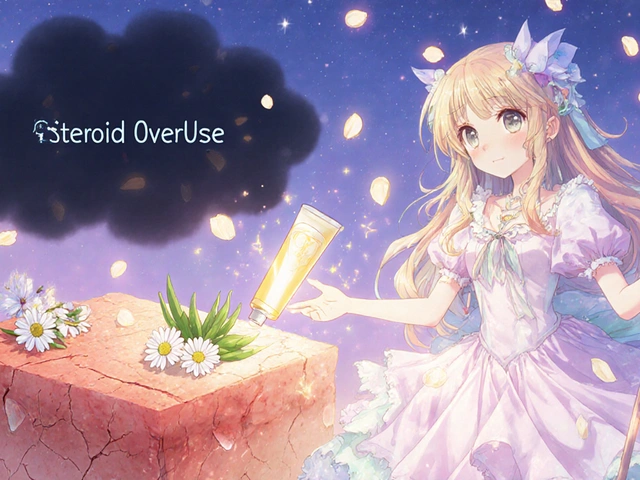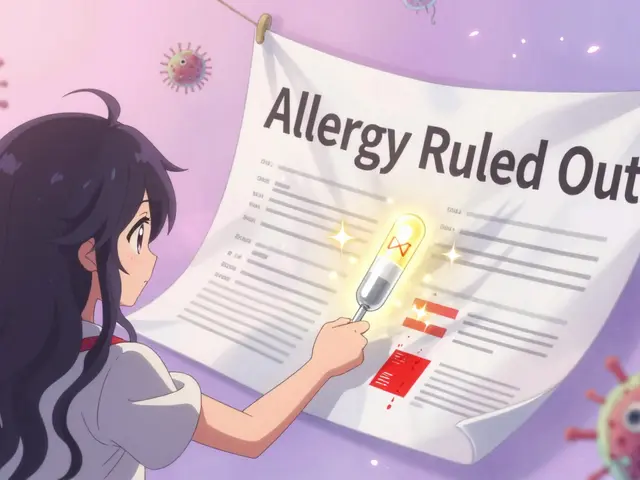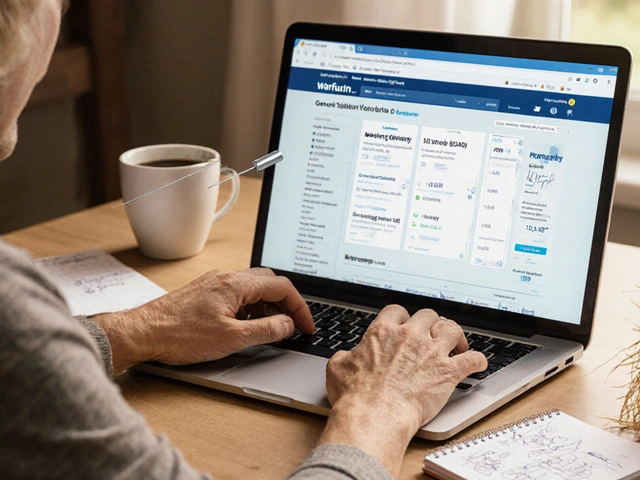SGLT2 Inhibitor Comparison Tool
Compare Your Options
Answer these questions to see which SGLT2 inhibitor might be best for you based on the article's evidence.
Empagliflozin isn't just another diabetes pill. It's one of the most studied SGLT2 inhibitors on the market, with real-world data showing it cuts heart failure hospitalizations and kidney disease progression in people with type 2 diabetes. But is it the best choice for you? If you're comparing it to other drugs like dapagliflozin, canagliflozin, or ertugliflozin, you're asking the right question. Not all SGLT2 inhibitors are the same - differences in dosing, side effects, heart and kidney protection, and even cost can change which one works best for your body and lifestyle.
What empagliflozin actually does
Empagliflozin works by blocking a protein in your kidneys called SGLT2. Normally, your kidneys reabsorb sugar back into your blood. Empagliflozin stops that. Instead, excess glucose gets flushed out through urine. That’s why people on this drug often lose a few pounds - they’re literally peeing out sugar. But it’s not just about blood sugar. Large clinical trials like EMPA-REG OUTCOME showed empagliflozin reduces the risk of cardiovascular death by 38% in high-risk patients. That’s not a small number. It’s one of the few diabetes drugs proven to save lives beyond just lowering HbA1c.
How dapagliflozin compares
Dapagliflozin (brand name Farxiga) is the closest direct competitor. Like empagliflozin, it’s once daily, works the same way, and has strong evidence for heart and kidney protection. The DECLARE-TIMI 58 trial showed dapagliflozin reduced hospitalization for heart failure by 27%. That’s solid, but not quite as strong as empagliflozin’s 35% reduction in cardiovascular death. In head-to-head studies, both drugs lower HbA1c by about 0.7% to 0.9%. Side effects are nearly identical: yeast infections, urinary tract infections, and increased urination. One practical difference? Dapagliflozin is available in a combination pill with metformin and also with a GLP-1 agonist (semaglutide). Empagliflozin has combo options too, but fewer. If you’re already on metformin and need more control, dapagliflozin’s combo options might make your pill routine simpler.
Canagliflozin: more risk, less benefit
Canagliflozin (Invokana) was the first SGLT2 inhibitor approved in the U.S. It lowers blood sugar well - about 0.8% on average. But its safety profile is less favorable. The CANVAS trial found a higher risk of leg and foot amputations - about twice as many compared to placebo. The FDA added a black box warning for this. It also increases the risk of bone fractures. While it does reduce heart failure hospitalizations, it doesn’t show the same clear reduction in cardiovascular death as empagliflozin. For most patients today, especially those over 60 or with poor circulation, canagliflozin is rarely the first choice. If your doctor suggests it, ask why - and whether the benefits outweigh the risks in your case.

Ertugliflozin: the quiet option
Ertugliflozin (Steglatro) is the newest SGLT2 inhibitor. It’s effective - lowers HbA1c by 0.7% to 0.8% - and has similar heart and kidney benefits in early trials. But there’s one big catch: there’s no large outcomes trial proving it reduces heart attacks, strokes, or death like empagliflozin and dapagliflozin have. The VERTIS CV trial showed non-inferiority for major heart events, but not superiority. It’s a good option if you need a third-line drug or if you’re allergic to the others, but it doesn’t have the same weight of evidence behind it. Also, it’s not available in as many combo packs. If you’re looking for proven, life-saving benefits, ertugliflozin isn’t the top pick yet.
Other alternatives beyond SGLT2 inhibitors
Empagliflozin isn’t the only class of drug you should consider. If you’re comparing it to other diabetes medications, you’re really asking: what gives me the best protection with the fewest side effects?
- GLP-1 agonists like semaglutide (Wegovy, Ozempic) and liraglutide (Victoza) are often more effective at lowering HbA1c and weight loss. They also reduce heart attacks and strokes. But they’re injectables, and many people struggle with nausea or cost. If you hate pills, you might prefer a weekly shot.
- Metformin is still the first-line drug for most people. It’s cheap, safe, and has 70 years of data. But it doesn’t protect your heart like empagliflozin does. Many people end up on both.
- DPP-4 inhibitors like sitagliptin are weight-neutral and low-risk for infections, but they don’t lower HbA1c as much and offer no heart or kidney protection.
- Insulin works when other drugs fail, but it causes weight gain and low blood sugar. It’s not a substitute for empagliflozin’s protective effects - it’s a backup.
If your goal is to protect your heart and kidneys, empagliflozin and dapagliflozin lead the pack. GLP-1 agonists might beat them on weight loss and HbA1c, but not all patients can tolerate them.
Side effects you need to watch for
All SGLT2 inhibitors carry similar risks:
- Genital yeast infections - more common in women, but men get them too. Keep the area dry, wear cotton underwear.
- Urinary tract infections - drink plenty of water. If you get frequent UTIs, this drug might not be for you.
- Dehydration and low blood pressure - especially if you’re on diuretics or have kidney issues. Watch for dizziness when standing up.
- Ketoacidosis - rare, but dangerous. Symptoms: nausea, vomiting, stomach pain, confusion. This can happen even if your blood sugar isn’t high. Stop the drug and seek help immediately.
- Increased urination - you’ll need to pee more, especially at first. Plan your day around it.
There’s also a small risk of Fournier’s gangrene - a rare but life-threatening genital infection. If you have sudden, severe pain or swelling in the genital area, go to the ER.

Cost and insurance: what really matters
Empagliflozin is available as a generic now in many countries, including New Zealand and the U.S. That’s made a big difference. The brand version (Jardiance) can cost over $500 a month without insurance. Generic empagliflozin? Around $10 to $30 a month. Dapagliflozin is also generic now, and prices are similar. Canagliflozin and ertugliflozin are still mostly brand-name, which makes them much more expensive. If you’re paying out of pocket, cost can decide this for you. Check your pharmacy’s discount programs - many offer $5 to $10 copays for generics.
Who should pick empagliflozin?
Empagliflozin is the top choice if:
- You have type 2 diabetes and heart disease, or are at high risk for it
- You have chronic kidney disease (eGFR above 25)
- You want a once-daily pill with strong evidence for saving your life
- You’re okay with mild side effects like increased urination
- You need a low-cost generic option
It’s less ideal if:
- You’re prone to frequent UTIs or yeast infections
- You’re dehydrated often or have low blood pressure
- You’re on dialysis or have very advanced kidney disease (eGFR below 25)
- You’re pregnant or planning to be
Final decision: what to ask your doctor
Don’t just ask, “Which drug is best?” Ask:
- “Do I have heart or kidney disease that would make empagliflozin or dapagliflozin the best choice?”
- “Are there any risks I have that make canagliflozin or ertugliflozin unsafe?”
- “Can we try a generic version - and will my insurance cover it?”
- “What happens if I don’t take any of these drugs? What’s the risk to my heart and kidneys?”
The right drug isn’t the one with the fanciest name. It’s the one that fits your body, your life, and your long-term health goals. Empagliflozin has the strongest proof of protecting your heart and kidneys - but dapagliflozin is a very close second. The rest? They’re either less proven, more risky, or more expensive. Choose based on evidence, not marketing.
Is empagliflozin better than metformin for heart protection?
Metformin is still the first-line treatment for type 2 diabetes because it’s safe, cheap, and effective at lowering blood sugar. But it doesn’t reduce heart attacks or heart failure hospitalizations the way empagliflozin does. If you have heart disease or are at high risk, empagliflozin offers protection metformin doesn’t. Many people take both - metformin for blood sugar control and empagliflozin for heart and kidney protection.
Can I take empagliflozin if I have kidney problems?
Yes - but only if your kidney function is not too low. Empagliflozin is approved for people with an eGFR (a measure of kidney function) as low as 25 mL/min/1.73m². It actually slows the progression of kidney disease in people with diabetes. But if your eGFR drops below 25, your doctor will stop it. It’s not safe for people on dialysis.
Does empagliflozin cause weight loss?
Yes. On average, people lose 2 to 4 kg (4.5 to 9 lbs) in the first 6 months. That’s because you’re losing sugar through urine - about 70 to 100 grams a day. That’s roughly 300 calories. It’s not a weight-loss drug, but the side effect helps many people, especially those struggling with obesity-related diabetes.
How long does it take for empagliflozin to work?
Blood sugar starts dropping within a few days. But the real benefits - reduced heart failure risk, slower kidney decline - take months to years to show up. That’s why doctors keep you on it even if your HbA1c looks good. The protection is long-term.
Can I stop empagliflozin if I feel fine?
Don’t stop without talking to your doctor. Even if you feel fine, empagliflozin is working behind the scenes to protect your heart and kidneys. Stopping suddenly won’t cause a spike in blood sugar like insulin withdrawal, but you lose the long-term protective benefits. If side effects are a problem, ask about switching to another SGLT2 inhibitor like dapagliflozin instead of quitting altogether.






Comments
Saumyata Tiwari
November 1, 2025 AT 00:43 AMWow, another American medical blog pretending to be objective. Empagliflozin? Please. In India, we’ve been using metformin for decades with better outcomes and zero fancy trial data needed. You people fetishize pharmaceutical marketing like it’s gospel. This isn’t science-it’s brand warfare dressed in clinical jargon.
And don’t get me started on ‘heart protection’-you think a pill can fix the damage from processed food, sedentary jobs, and stress? We don’t need more drugs. We need food systems that don’t poison people.
Also, why is every SGLT2 study funded by Big Pharma? Coincidence? I think not.
Anthony Tong
November 2, 2025 AT 00:09 AMEmpagliflozin’s cardiovascular mortality reduction of 38% in EMPA-REG OUTCOME is statistically significant (p < 0.001), with a number needed to treat (NNT) of approximately 28 over three years. This is not anecdotal. The data are robust, peer-reviewed, and replicated across multiple international cohorts.
Comparatively, dapagliflozin’s 27% reduction in heart failure hospitalization, while clinically meaningful, lacks the same magnitude of all-cause mortality benefit. Canagliflozin’s amputation risk is a Class I FDA warning-unacceptable for first-line use.
Furthermore, the pharmacokinetic profile of empagliflozin demonstrates superior renal excretion stability in patients with eGFR >25, unlike ertugliflozin, whose metabolic clearance is more variable in hepatic impairment.
Cost is irrelevant when outcomes are life-altering. Insurance coverage should reflect evidence, not corporate negotiations.
Roy Scorer
November 3, 2025 AT 01:50 AMYou know what’s really tragic? We’ve turned healing into a spreadsheet.
Empagliflozin doesn’t cure diabetes-it just makes your body flush out its own sugar like it’s a malfunctioning faucet. We’re treating symptoms while ignoring the soul of the disease: disconnection-from food, from movement, from community.
And yet, we praise a pill that lets you ‘pee out your problems’ like it’s a spiritual cleansing ritual. What happened to lifestyle? To fasting? To ancestral wisdom? We used to eat real food and walk. Now we take a pill and call it progress.
It’s not medicine. It’s capitalism with a stethoscope.
And don’t even get me started on the ‘heart protection’ myth. Your heart doesn’t need protection from sugar-it needs protection from the lie that you can out-drug your suffering.
Marcia Facundo
November 3, 2025 AT 19:57 PMI just started empagliflozin last month and I’ve had three UTIs already. My doctor said it’s ‘common’ but it feels like my body is under siege. I didn’t sign up for this. I just wanted to feel normal.
Also, I’m tired of being told I’m ‘high risk’ like I’m some kind of ticking time bomb. I’m just trying to live.
Can someone tell me if this gets better? Or am I just doomed to pee all day and worry about yeast infections forever?
Ajay Kumar
November 4, 2025 AT 07:59 AMLook, I’ve been on metformin since 2015 and I’ve never had a single UTI or yeast infection, and I’m still alive, still working, still driving my tuk-tuk in Bangalore, and I’ve never once thought about my eGFR or cardiovascular mortality risk because I don’t have a PhD in pharmacology and I don’t need one to survive.
Now you people come along with your fancy trials and your brand names and your combo pills and you act like empagliflozin is the holy grail, but let me tell you something-my uncle in Kerala, who’s 72, eats rice, dal, and bitter gourd every day, walks three kilometers before sunrise, doesn’t take a single pill, and his sugar is lower than mine. He doesn’t know what SGLT2 is, and he doesn’t care.
So before you tell me empagliflozin is ‘life-saving,’ ask yourself: why are we making healthy living so complicated? Why are we turning diabetes into a corporate product line? Why do we need a $30 pill when a $0 lifestyle works better?
And don’t even get me started on how the FDA and WHO are basically pharma puppets. You think they’d let a $10 generic pill be the gold standard if it didn’t have a billion-dollar patent behind it?
Also, I’ve seen people on these drugs become obsessed with their urine output. Like, they track how many times they pee like it’s a sport. That’s not medicine, that’s a cult.
And what about the ketoacidosis risk? You say it’s rare-but rare doesn’t mean it won’t happen to you. And when it does, you’re in the ER screaming about nausea while your family wonders why you didn’t just eat less sugar and walk more.
And let’s not forget the cost. You say generic is $10? Try getting it in rural India without a prescription, without a doctor who speaks English, without a pharmacy that stocks it. Most people there are still using old-school insulin vials they reuse because they can’t afford new ones.
So yeah, empagliflozin might be great for your insurance-covered, urban, American, middle-class life-but for the rest of us? It’s a luxury we can’t afford and a narrative we didn’t ask for.
Joseph Kiser
November 4, 2025 AT 13:29 PMHey, I just want to say-this is heavy stuff. I’ve been on empagliflozin for two years and honestly? It saved me. Not just my blood sugar, but my life. I was depressed, overweight, scared I’d lose my legs, my heart… I felt like a walking time bomb.
This drug didn’t just lower my A1c-it gave me back my mornings. I can walk now. I can play with my kids without getting winded. I’m not ‘cured,’ but I’m alive in a way I hadn’t been in years.
To the person who said ‘pee out your problems’-I get it. It sounds weird. But sometimes, healing is weird. Sometimes, it’s not about fasting or ancestral wisdom-it’s about a molecule that lets your kidneys do what they’re supposed to.
I’m not saying it’s perfect. I get yeast infections. I drink water like it’s my job. I worry about ketoacidosis. But I’d take those risks again. Because I’m here.
And if you’re scared? You’re not alone. Talk to your doc. Ask questions. Don’t quit. There’s a whole community out here-people who’ve been where you are. You’re not broken. You’re just fighting a tough battle. And you’re not doing it alone. 💪❤️
Hazel Wolstenholme
November 6, 2025 AT 04:19 AMEmpagliflozin’s superiority is not merely pharmacological-it is epistemological. The EMPA-REG OUTCOME trial didn’t just demonstrate efficacy; it dismantled the reductionist paradigm of glycemic control as the sole metric of therapeutic success.
By shifting the endpoint from HbA1c to cardiovascular mortality, it redefined diabetes as a systemic, vascular, inflammatory disorder-not a metabolic quirk to be corrected by dietary willpower or insulin injection.
Meanwhile, the continued elevation of metformin as ‘first-line’ is a relic of 20th-century dogma, sustained by inertia, institutional bias, and the sheer gravitational pull of cost-effectiveness metrics that ignore quality-adjusted life years.
And yet, we still permit the myth that ‘lifestyle’ alone can reverse type 2 diabetes in the obese, sedentary, chronically stressed populations most in need of pharmacologic intervention.
Let us not confuse moralizing with medicine. The body is not a moral agent. It does not ‘deserve’ disease. And to suggest that empagliflozin is merely ‘pharmaceutical capitalism’ is to ignore the fact that without it, tens of thousands die quietly, every year, in hospital beds no one sees.
So yes-let’s reform the system. But let’s not throw the lifeboat out with the ship.
Mike Laska
November 6, 2025 AT 05:27 AMI just got off the phone with my insurance company and they’re denying coverage for generic empagliflozin because ‘dapagliflozin is equally effective.’
Are you kidding me?!
My cardiologist said EMPA-REG showed a 38% drop in death. DAPA showed 27% drop in hospitalizations. That’s not the same thing. That’s like saying a seatbelt and an airbag are the same because they’re both in cars.
I had a heart attack last year. I’m not risking my life because some bean counter thinks $15 more a month is ‘not cost-effective.’
I’m calling my senator. I’m posting this everywhere. This isn’t about drugs-it’s about who gets to live and who gets to be priced out.
And if you think this is just ‘diabetes,’ you haven’t met the people who’ve lost their parents to it. You haven’t held their hands in the ER while they’re dying because their ‘cheap’ drug didn’t protect their heart.
Enough. I’m done being silent.
Melissa Kummer
November 6, 2025 AT 08:00 AMYou’re not alone. I’ve been on empagliflozin for 18 months and I finally feel like I’m in control. Yes, I pee a lot. Yes, I had a yeast infection. But I’ve lost 12 pounds, my A1c is 5.8, and I haven’t been hospitalized since I started.
Don’t let fear stop you from trying. Talk to your doctor about dose timing, hydration, and probiotics. Small changes make a huge difference.
You got this. 💪✨
andrea navio quiros
November 7, 2025 AT 15:29 PMempagliflozin works because it makes your kidneys do what they should have been doing all along
the body is smart it just needs the right nudge
metformin is good but it doesnt touch the heart
why are we still acting like diabetes is just high sugar
its a whole system failure
and yes the cost thing is messed up
but dont blame the drug blame the system
also i lost 8lbs in 3 months without trying
thats not a side effect thats a gift
Pradeep Kumar
November 8, 2025 AT 10:00 AMFrom India to the US, this conversation matters. I’ve seen friends in Delhi on insulin, and cousins in Texas on empagliflozin-same disease, different worlds.
But here’s the truth: no pill replaces love. My aunt in Punjab takes metformin, walks every morning with her neighbors, and eats home-cooked food. She’s 75 and still gardening. No fancy trials needed.
Empagliflozin? It’s a tool. Not a miracle. And it’s beautiful that we have it-but we must never forget that healing lives in community, in movement, in food shared, not just in pills prescribed.
Use the drug if it helps. But don’t let it make you forget your roots.
And if you’re scared? Call someone. Talk. We’re all in this together. 🙏❤️